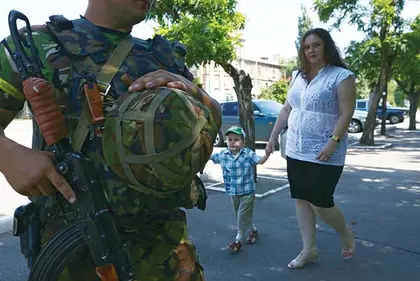The gunmen got angry with his response and plundered Krasiuk’s shop of used consumer electronics. They took his car and detained him for two days until his wife paid nearly $2,000 for his release.
Now, Krasiuk is celebrating after Ukrainian soldiers on July 22 liberated the Luhansk Oblast city of 110,000 residents. His story is being repeated across eastern Ukraine in recent weeks, as Ukraine’s army frees one city after another from occupation by armed Kremlin-backed guerillas and Russian mercenaries.
JOIN US ON TELEGRAM
Follow our coverage of the war on the @Kyivpost_official.
The big prizes – control of the provincial capitals of Donetsk and Luhansk – are left for the Ukrainian government to take amid reports of fierce fighting this week.
While some in the liberated cities supported the Russian-backed guerillas most say they suffered extortion, violence and intolerance.
When Ukrainian soldiers arrived here at a jail, they found four prisoners and two fresh corpses. All were locals, according to Oleksandr Zaporozhtsev, deputy police chief of Severodonetsk, He also said that the separatists took dozens of hostages while retreating.
Russian-backed forces took control of the city in late May. Their strength reached up to 1,000 armed people and included Russians as well as representatives of the self-proclaimed Luhansk People’s Republic.
For their main headquarters, the separatists seized a nine-story building of the state-run Institute of Azot Industry, where some 400 fighters, including mercenaries reportedly from the Dagestan Province of Russia, settled.
They left mines, orange-and-black St. George ribbons that symbolize their pro-Russian orientation, a trampled Ukrainian flag, and leaflets from the Moscow-based Orthodox Foundation collecting money for the needs of New Russia – the Kremlin’s description of southeastern Ukraine.
Their leader was Pavel Dremov, who ruled Severodonetsk and directed a paramilitary Russian Cossack group. He is a former bricklayer from Stakhanov. They ruled ruthlessly, persecuting local drug deals and beating those convicted of looting.
But the reign of terror soon hit ordinary people also.
Krasiuk recalled a farmer who was captured at a checkpoint as he was taking milk and strawberries to sell at the local market. He was falsely accused of helping the Right Sector, a militant nationalist group. Krasiuk said that he and the farmer were imprisoned together and heard the farmer scream from torture. He doesn’t know what became of the fellow prisoner.
“I doubt that man stayed alive,” he said.
Four representatives of the Organization for Security and Cooperation in Europe were captured in Severodonetsk on May 29 and kept for nearly a month by separatists led by Nikolai Kozitsyn.
On July 10, a number of houses in Severodonetsk, including a big hotel complex, were damaged by shelling. While the separatists blamed the Ukrainian army, locals believe the separatists orchestrated the attacks to win the favor of local residents. Just a few minutes after the shelling, for instance, insurgents showed up, accompanied by Russian journalists who quickly reported that the Ukrainian army was shelling residential areas.
But the worst shelling came from July 18-22, when six people were killed and dozens wounded. Just like in previous takeovers, the Ukrainian troops applied Grad multiple rocket launchers, but denied using them on civilian targets. Overall, however, Severodonetsk did not experience big fights as separatists retreated south.
Oleksiy Svetikov, a local journalist and activist, believes that billionaire Dmytro Firtash, owner of city’s biggest Azot chemical plant, helped convince – or pay – the separatists to leave.
But days later, many residents are still hiding in school basements because they fear shelling, which can still be heard from several miles away from the fierce fighting that is under way in Lysychansk.
A few people gathered on July 23 at Severodonetsk’s main square, where a statue of Vladimir Lenin has a Ukrainian flag for a scarf.
When spotting a group of three Berkut riot police officers from Kirovograd, who were patrolling the city to make sure there were no more Kremlin-backed separtists left in the city, many people approached to thank them and bring them some food. Seeing them Krasiuk, the businessman, ran up to them and started shaking their hands, furiously and friendly.
“You can’t imagine how happy I am to see you guys here,” he said.
Kyiv Post staff writer Oksana Grytsenko can be reached at [email protected]
Editor’s Note: This article has
been produced with travel support from www.mymedia.org.ua, funded by the Ministry of Foreign Affairs of Denmark and implemented
by a joint venture between NIRAS and BBC Media Action, as well as Ukraine Media
Project, managed by Internews and funded by the United States Agency for
International Development. The content is independent of these organizations
and is solely the responsibility of the Kyiv Post.
You can also highlight the text and press Ctrl + Enter




